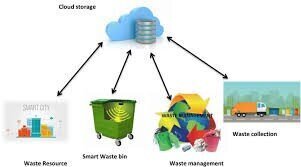Smart waste management leverages artificial intelligence (AI) technologies to enhance the efficiency and effectiveness of waste collection and processing. By integrating smart devices and data analytics, waste management systems can monitor, manage, and optimize waste collection processes in real-time.
Smart Waste Bins
Smart waste bins are equipped with sensors that track fill levels, allowing for timely collection and reducing the risk of overflow. These bins communicate their status to waste management systems, which can prioritize collection routes based on real-time data. This capability not only minimizes unnecessary trips but also reduces fuel consumption and operational costs. Studies indicate that AI can decrease transportation distances by up to 36.8% and save costs by approximately 13.35% in waste logistics[1].
Waste Management Applications
AI-driven waste management applications utilize machine learning algorithms to analyze data collected from smart bins and other devices. These applications can predict waste generation patterns, optimize collection schedules, and enhance recycling efforts. For instance, AI can identify non-recyclable materials in waste streams and suggest alternative disposal methods, thereby improving recycling rates and resource recovery[2][3].
Advanced Sorting Technologies
In addition to smart bins, AI technologies are employed in advanced sorting systems that utilize visual and hyperspectral cameras. These systems can differentiate between various materials, allowing for more accurate sorting of recyclables from non-recyclables. By analyzing the physical and chemical properties of waste items, these systems can significantly improve the efficiency of waste processing and minimize contamination[2][4].
Benefits of AI in Waste Management
The integration of AI in waste management offers numerous advantages:
-
Increased Efficiency: Automated systems streamline the waste collection process, reducing labor costs and improving response times.
-
Cost Savings: Optimized routes and reduced collection frequency lead to lower operational expenses.
-
Environmental Impact: Enhanced sorting and recycling capabilities contribute to reduced landfill use and lower greenhouse gas emissions, supporting sustainability goals[1][5].
-
Public Health: Improved waste management practices can mitigate health risks associated with improper waste disposal, particularly in urban areas[3].
Conclusion
The application of AI in smart waste management represents a significant shift towards more sustainable and efficient practices. By utilizing smart bins, advanced sorting technologies, and data analytics, waste management systems can optimize operations, reduce environmental impact, and improve public health outcomes. As cities continue to grow, the need for innovative waste management solutions will become increasingly critical, making AI an essential component of future strategies[2][4][5].
Further Reading
1. https://link.springer.com/article/10.1007/s10311-023-01604-3
2. AI-Powered Waste Management System to Revolutionize Recycling | College of Natural Resources News
3. Smart waste management: A paradigm shift enabled by artificial intelligence – ScienceDirect
4. How AI is Revolutionizing Solid Waste Management
5. Artificial Intelligence and Waste Management | RTS


